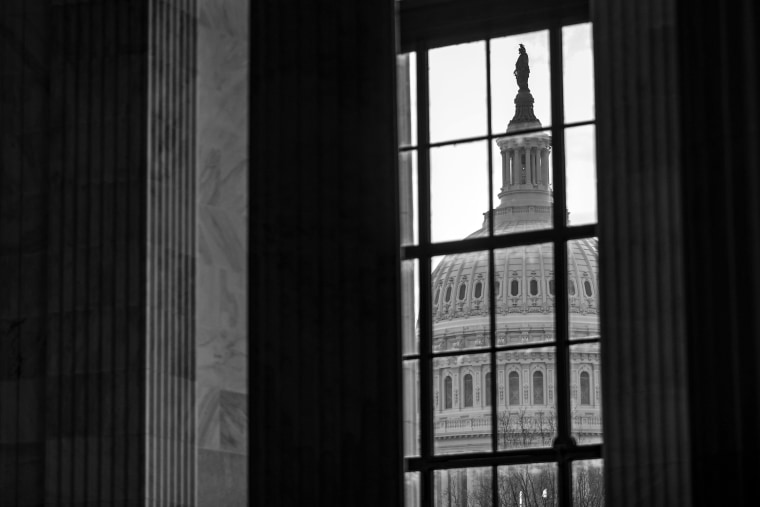The filibuster reforms touted by Senate Democrats are not intended to be temporary. The chamber once operated as a majority-rule institution, and many reform advocates want to restore that model -- not just in this Congress, but forevermore.
In the short term, that would at least make it possible for the narrow Senate Democratic majority to advance some of its agenda, but in the long term, it would also make future majorities -- of any party -- capable of doing the same thing.
And for those concerned with the Republican Party's radicalism, that's a real problem. Ruth Marcus devoted her column the other day to a scenario in which Democrats scrap the filibuster rule this year, only to see a dominant GOP majority in 2025 eager to take advantage. Reflecting on the "nightmare," Marcus wrote, "Welcome to the apocalypse."
Congressional Republicans move quickly to implement their agenda. The border wall is fully funded. Voter ID is a requirement for federal elections, while mail-in voting is limited to those who can demonstrate a need. The assault weapons ban and stricter background check rules that Democrats enacted are repealed; instead, the right to carry concealed weapons without a permit applies nationwide. Abortions are banned after the 20th week of pregnancy. Planned Parenthood is defunded. Unions are mortally wounded by a national right-to-work rule protecting employees from having to pay dues.
The column kept going down the same path, imagining more tax breaks for billionaires, more oil drilling, more restrictions for refugees, and so on.
If my email inbox is any indication, MaddowBlog readers have plenty of related concerns along the same lines. Sure, the prospect of Democrats passing good bills sounds nice, you've told me, but it wasn't long ago when Republicans held all the reins of federal power, and it's only a matter of time before they do so again.
If the filibuster can serve as a check against some of the most dangerous GOP ideas, perhaps keeping it around isn't such a bad idea?
Part of the problem with such an approach is that it's a recipe for semi-permanent legislative stagnation. Lawmakers may be able to pursue some goals through the difficult budget reconciliation process, and one party or the other may in rare occasions end up with a 60-vote majority (see late 2009, for example), but leaving the Senate status quo in place indefinitely means tolerating a sclerotic Congress for the foreseeable future.
That's not an option anyone should find appealing. The nation faces real challenges, and Americans have a legislative branch that's supposed to be able to address those challenges.
But there's also a principled angle worth considering: if American voters are repulsed by the "apocalyptic" scenario Marcus described in her column, they can choose to elect someone else.
In broad strokes, we know how our democracy is supposed to function: people step up to serve, telling voters about the goals and priorities they'd pursue if elected. If the electorate likes those goals and priorities, the candidates win and act accordingly. Rival candidates offer an alternative vision and urge voters to give them a chance the next time.
If the public likes what the winning candidates did, those officials get re-elected. If not, they're replaced with someone new. It's Democracy 101.
The filibuster short-circuits the model. Americans may endorse a series of ideas, and they may elect presidents, senators, and representatives to approve those ideas, but a requirement for a Senate supermajority -- a historical anomaly -- inevitably causes gridlock that derails popular and worthwhile proposals, fueling cynicism and apathy.
Yes, a radicalized Republican Party, if rewarded with power, would almost certainly approve many regressive and misguided proposals if there were no filibusters standing in their way. But that doesn't mean the filibuster is good; it means the GOP agenda is bad. If voters don't want the country to move in a far-right direction, they should elect officials who won't take the country in that direction. If the electorate chooses to put far-right policymakers in power, Americans should necessarily expect far-right policies. Democracy tends to work that way.
Of course, there's a credible argument that the Republican assault on voting rights rigs the game, creating a political landscape in which what Americans want and what they get are two very different things. It's an important point.
But that's a recipe for scrapping the filibuster and approving the democracy-reform For The People Act, not leaving the filibuster intact so that neither party can govern at all.
